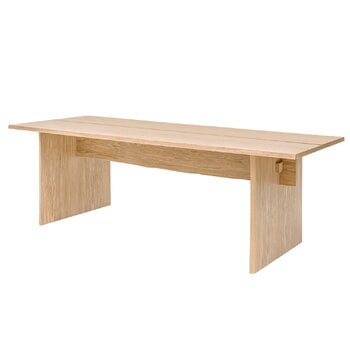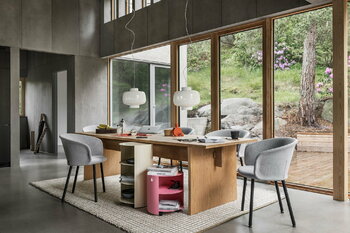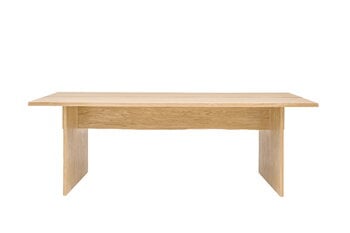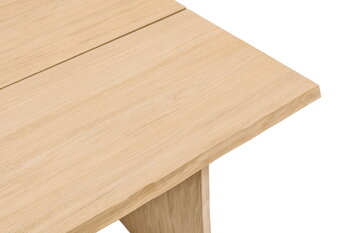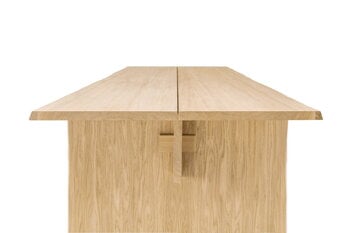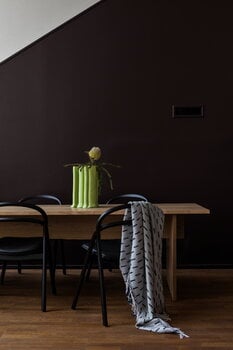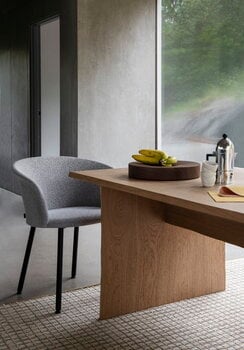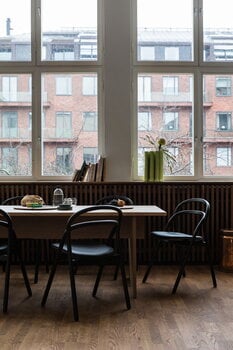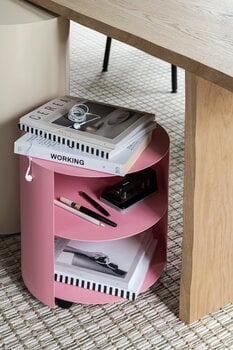Hem’s Bookmatch dining table, designed by Philippe Malouin, is a tribute to traditional carpentry and artisanship. The table’s oak veneer surfaces are adorned with natural wood grain patterns that beautifully emphasise the simple but considered and skilfully executed structure of the table. Bookmatch's raw and robust look is guaranteed to catch the eye in both modern dining areas and office meeting rooms.
Bookmatch table, 220 x 90 cm, oak
Hem
Description
Hem’s Bookmatch dining table, designed by Philippe Malouin, is a tribute to traditional carpentry and artisanship. The table’s oak veneer surfaces are adorned with natural wood grain patterns that beautifully emphasise the simple but considered and skilfully executed structure of the table. Bookmatch's raw and robust look is guaranteed to catch the eye in both modern dining areas and office meeting rooms.
Product details (6)
- Colour
- Natural
- Length
- 220 cm
- Width
- 90 cm
- Height
- 73 cm
- Material
- Lacquered oak veneer
- Weight
- 62 kg
- Product ID
Designer
Philippe Malouin is a British-Canadian designer who lives and works in London. He has studied design at the Design Academy in Eindhoven, the École Nationale Supérieure de Création Industrielle in Paris and the University of Montreal. Prior to establishing his own design studio, Malouin worked for English designer Tom Dixon, and from 2012 to 2015, he worked as a teacher at the Royal College of Arts, London. Malouin also works in architecture and interior design as director of POST-OFFICE.
Malouin is known as a versatile designer whose products are easy to understand and use. He believes in the calming effect of simple, refined design that serves a practical purpose. In his career, Malouin has designed furniture, lamps, rugs as well as art objects, and collaborated with Resident, SCP, Kvadrat, Iittala, Swarovski and Aesop, among others.
• Read Philippe Malouin's interview >
View all productsReviews (0)
Sustainability
The Product Sustainability Framework, our criteria of sustainable design, helps you find the most sustainable products in our selection. Read below which sustainability criteria this product has met.
Working conditions & labour 8/9
-
Equal opportunities for all employees
-
Commitment to UN Global Compact, fair compensation for all employees
-
Corporate responsibility requirements defined and communicated for suppliers
-
Systematic work for improved inclusion and well-being in the workplace
-
Transparent supply chain
-
Suppliers' compliance to a code of conduct ensured
-
Compliance to the UN Guiding Principles on Business and Human Rights ensured in the supply chain
-
Support for community involvement in the supply chain
-
Direct suppliers audited and certified
Eco-friendly production 8/9
-
Fair and resource-wise water-use in production
-
No incineration or landfilling of returned items
-
No use of endangered species as materials
-
No direct environmental emissions or waste (excl. GHGs) from production
-
The sustainability of direct suppliers' production is addressed and monitored
-
Production and material sourcing that respect biodiversity, animal rights, and natural ecosystems
-
Material-efficient and ecological packaging
-
No potentially harmful chemicals used in own production
-
Positive impact on nature’s well-being through operations that regenerate natural ecosystems
Climate impact 4/8
-
Company's direct greenhouse gas emissions identified and commitment to reduction
-
Product's carbon impact identified and commitment to reduction
-
Guidance on energy- and eco-efficient use of the product
-
100 % renewable energy in own production and operations
-
Contribution to climate initiatives beyond the brand’s direct operations
-
Low-carbon or compensated transportation
-
Carbon footprint of the product calculated and goals set to reduce it
-
Carbon neutral or carbon negative product
Sustainable materials 5/6
-
Sustainable and long-lasting material choices
-
No harmful or hazardous substances
-
Responsible raw material sourcing and production
-
Materials suited for circularity: monomaterials, recyclable finishings, renewable or recycled contents etc.
-
Ecological materials: natural, biodegradable, recyclable or recycled contents
-
Outstanding materials in terms of innovativeness, responsibility, sustainability and circularity: local production or sourcing, 100 % recycled content, C2C-certification etc.
Circular design 4/5
-
High aesthetic quality promoting long-term use of the product
-
Technically durable product design and material choices
-
Design for enduring life-long quality
-
Design and support for product maintenance, repair and upgradability
-
Innovative circular design solutions: circular service system, resale platform, remanufacturing, collection of used products, etc.
